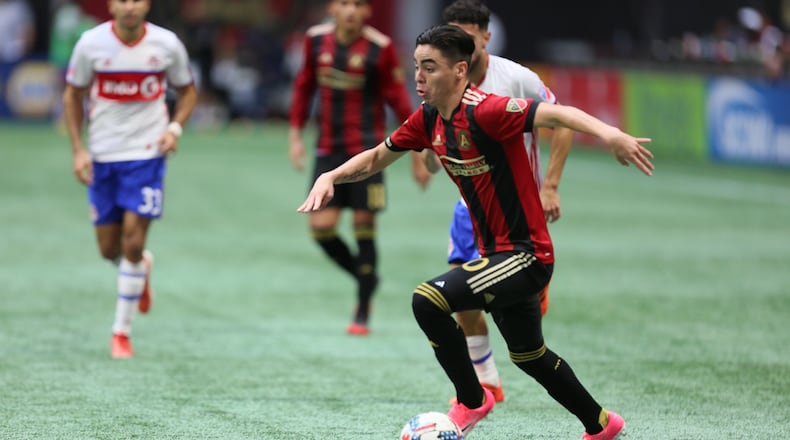Miguel Almiron waves to a group of adoring fans. A select few had been afforded a behind-the-scenes look at Atlanta United training for the day. He smiles through a window. They fawn.
All this from a spacious practice facility that didn’t exist, in a city he knew nothing about, when he arrived two years ago.
The strides Atlanta has taken to embrace soccer even startle Almiron, his high-profile stature being Exhibit A. He’s not Julio Jones or Freddie Freeman. But his stardom is distinct.
Just 24 months prior, Atlanta United technical director Carlos Bocanegra and other officials met with an open-minded 22-year-old Paraguayan midfielder. They opened their laptops and sold nothing more than a vision.
“This is what Mercedes-Benz Stadium is going to look like,” Bocanegra told Almiron as he showed him the plan. “And this is what it’s going to look like with fans in it. This is what our training facility will look like, and it’s being built right now.”
Said Bocanegra, looking back recently: “It was a real interesting conversation, not only with him but with everybody. We’re selling a club that doesn’t exist.”
There was a point when that vision became a reality, and then another point when all realistic hope was exceeded. Almiron came to Atlanta United to play for Gerardo Martino, though from Argentina he was a legend in Paraguay after coaching in Almiron’s native country. He came to live an American life and improve as a player, then to move to a major European club shortly after.
He didn’t expect this.
“It’s a beautiful city,” Almiron says through a translator. “I really like it here. I’m happy.”
It’s an odd dichotomy for a player who, no more than two years ago, couldn’t place Atlanta on a map, no less gush over its beauty. Certainly, play on the field has something to do with it.
Almiron’s tangible statistical contribution of eight goals and 11 assists perhaps even belies what is intangible and unassailable in his game — the spark plug of an on-field powerhouse, sitting alone atop the Eastern Conference; the glue that holds a flamboyant offense and opportunistic defense together; the foundation of a revolutionary MLS franchise not even two years in.
“I always say, I never imagined we would have such great support that we do from our fan base, that we’re always in front of full stadiums,” Almiron said. “That’s something we really appreciate, and is the thing that surprised me the most.”
When Bocanegra and the Atlanta United front office set out to fill a roster before its inaugural season, they targeted Almiron as a tailor-made fit for the attacking midfield role in their desired run-and-gun, high-tempo offense.
At the time, Bocanegra says, the team had already sold over 10,000 season tickets. They didn’t need a post-prime European player for the sake of name recognition. In Atlanta the fans could make the star, not vice versa.
“Part of the philosophy, part of the mission, we thought we can bring some unknown entities here and turn them into stars or make them stars in their own right,” Bocanegra said.
“He’s very well known down in South America and in CONMEBOL (South American Football Confederation), the soccer circles. But maybe to the average fans, people weren’t necessarily aware of him. He’s come here and really big credit to him, on the field, off the field, embracing the city, embracing the team, embracing the culture.”
So they shelled out a then MLS-record $8 million in an investment of short-term success and long-term payoff.
There is a flip side to that strategy. One that has been easy to ignore in the honeymoon phase of Atlanta United, but one that will rapidly come to a head. With each passing day, seemingly another European club throws its hat in the ring — Newcastle, Fiorentina, Arsenal, West Ham, and others have all been linked to Almiron in some form. Rumored sums have reached as much as $20 million.
“My goal is to get to Europe and to play on an elite team or at an elite level,” Almiron said, before adding the caveat. “I’m not desperate that that moment comes soon.”
That’s healthy. That’s how this new MLS ecosystem will work, at least for now. Buying him for $8 million and then selling multiple years down the road would be a monumental blueprint for Atlanta United and the rest of MLS. Bocanegra declined to comment on any specific offers, but spoke with fearlessness and pride about the message that kind of sale would send about the growth of the league.
“We’re not afraid if people come with us, they develop, learn English, they improve their game, they continue to get better, and if they’re able to they go on and are sold overseas,” Bocanegra said. “I don’t think we’ve ever shied away from that and I think it’s a really good thing.”
But there will be a sting. It’s a natural consequence of being a destination and not the destination.
There will be a new superstar, a new fan-favorite to fall for. But Almiron — his sheepish smile, whistling energy, immense talent — will always have been this franchise’s first.
Fans long departed, morning training complete, Almiron lifts from his chair and heads back into the training facility. Then, for the time being, back to his city.
About the Author
Keep Reading
The Latest
Featured


